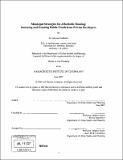Municipal strategies for affordable housing : incenting an exacting public goods from private developers
Author(s)
Goldstein, Ari Alowan
DownloadFull printable version (9.011Mb)
Other Contributors
Massachusetts Institute of Technology. Dept. of Urban Studies and Planning.
Advisor
Langley Keyes.
Terms of use
Metadata
Show full item recordAbstract
This thesis studies the next generation of municipal housing policy by asking, "How can cities effectively use the private-sector to promote affordable housing development?" In response, it looks at an array of public-sector municipal policy tools ranging from incentives to exactions. In particular, it focuses on tools that are able to leverage hot real estate markets, such as inclusionary zoning, linkages, and tax abatements. A framework for understanding the constraints and opportunities of past and future policies is established by looking at the economic, legal, and political implications of these exactions and incentives. The interplay of the three forces has affected and will continue to shape the policies that cities are able to implement. Two cities, Boston and New York, each with hot real estate markets, large shortfalls of affordable housing, and sophisticated public policy makers are studied in detail within the overarching framework. Generally, it is argued that effective policy implementation depends on strong market values for residential and commercial real estate, specific legal authority or a grant of broader municipal autonomy from the state, and active political coalitions of affordable housing advocates and developers with a receptive political administration. (cont.) While it is ideal to have alignment of these economic, legal, and political conditions, policies need only two of the three legs to begin to walk. The thesis elaborates on how cities can parlay their particular strengths into effective policies. Additional lessons and implications are also identified and the most promising policies are outlined, with special attention paid to how they could be structured and advanced further in the case study cities and for the first time in other municipalities throughout the United States. The thesis seeks to help municipal policy makers, housing advocates, and private developers understand the array of policy options and the forces that influence their viability.
Description
Thesis (M.C.P.)--Massachusetts Institute of Technology, Dept. of Urban Studies and Planning, 2007. Vita. Includes bibliographical references (p. 118-122).
Date issued
2007Department
Massachusetts Institute of Technology. Department of Urban Studies and PlanningPublisher
Massachusetts Institute of Technology
Keywords
Urban Studies and Planning.